GreenMuseumMeeting Cairo 2025
Crossing borders, shaping sustainability: The third and final network meeting of the Green Museum Hub in Cairo
From 25 April to 1 May 2025, the third and final network meeting of the international Green Museum Hub project took place in Cairo - a project that rethinks museums as places of sustainability. Funded as part of the DAAD Ta'ziz programme, the initiative brings together museum experts, scientists and sustainability experts from Egypt, Tunisia and Germany. Their common goal: to make museums fit for the future - ecologically, socially and culturally.
Seven days of intensive discussion, learning, sharing and planning: With visits to outstanding museums in Cairo and Alexandria, practical workshops and inspiring lectures, the week developed into a lively forum for sustainable museum work. The focus was on concrete measures for energy efficiency, inclusion, digital education and community-orientated conservation - always in line with the United Nations Sustainable Development Goals (SDGs).
From the pyramids of Giza to the Coptic Museum and the Museum of Islamic Art to the traditional Egyptian Museum and the Manial Palace: the participants immersed themselves in Egypt's rich cultural landscape - and at the same time in questions of how historical collections can be preserved ecologically, designed to be accessible, and anchored locally.
The practical workshops organised by the international partners, including the SMAC in Chemnitz, the Badisches Landesmuseum and the Julius-Maximilians-Universität Würzburg, were particular highlights. Young academics and students from Helwan University and the Université de la Manouba also contributed to the diversity of the exchange with their perspectives and ideas.
The meeting in Cairo marked the culmination of the Green Museum Hub's networking phase - but it was not the end of the collaboration: a joint Green Museum Camp in Tunis and a final exhibition in which the results of the project can be seen and experienced will follow in October.
Conclusion
The week in Cairo not only imparted knowledge, but also built bridges - between countries, disciplines and generations. In this way, the Green Museum Hub will continue to support museums in the future in becoming sustainable, inclusive and future-proof places for everyone.
GreenMuseumMeeting, Tunis 2024
From 22 to 27 June 2024, our first major network meeting on sustainability in the field of cultural heritage took place in Tunisia. This event, organised as part of the ‘GreenMuseumHub: Sustainable Futures for Museums and Heritage Sites’ project, brought together experts and researchers from three universities, Julius-Maximilians-Universität Würzburg in Germany, Helwan University in Egypt and La Manouba University in Tunisia, as well as non-university stakeholders.
Opening of the network meeting - forum on 22 June 2024
The kick-off event took place on 22 June in the form of a forum that brought together teachers and researchers from the participating universities as well as other cultural stakeholders. The focus was on sharing knowledge and experiences on the sustainable orientation of museums and cultural heritage sites. This first meeting provided an excellent platform for interdisciplinary dialogue between the partner institutions and helped to discuss and develop innovative approaches for sustainable work in museums. Each participant presented their institution and sustainability goals and/or projects.
Network meeting participants and deepening relationships
The diverse group of experts from Egypt, Germany and Tunisia consisted of project managers, coordinators, directors and employees of renowned museums such as the smac, the Deutsches Hygiene-Museum Dresden, the Museum der Alltagskultur Waldenbuch, the National Museum of Egyptian Civilisation in Cairo and the Alexandria National Museum. The Tunisian hosts, in particular the partners from La Manouba University, welcomed us with extraordinary hospitality, which played a decisive role in enabling us to get to know each other better and network more closely during the joint activities.
Continuation of the meeting with excursions and visits
The following days of the meeting were characterised by excursions to various important cultural sites and museums in Tunisia. On 23 June, the participants visited Dougga and Testour, which are rich in cultural heritage and historical significance. On 24 June, the participants continued their visits to the National Museum of Bardo and the Coin Museum, focusing on the importance of the preservation and sustainable presentation of cultural heritage.
This was followed on 25 June by an excursion to the archaeological site of Carthage and the Centre for Arab and Mediterranean Music, highlighting the diverse cultural expressions and the importance of their preservation. These visits provided participants with valuable insights into the challenges and opportunities associated with the sustainable management of such important sites.
Closure of the network meeting
26 June marked the end of the network meeting with a final visit to the National Military Museum. This final excursion gave the participants the opportunity to round off the meeting with reflective talks and discussions about the insights and experiences gained during the week.
Conclusion
The ‘GreenMuseumHub’ network meeting in Tunisia was a successful platform for international exchange and cooperation on sustainability in the museum and cultural heritage sector. The combination of academic discussions and hands-on visits enabled participants to gain in-depth knowledge and new perspectives that can contribute to the promotion of sustainable practices in museums and cultural heritage sites worldwide. Thanks to the warm hospitality of the Tunisian partners, not only was the exchange of expertise promoted, but also personal familiarisation was intensified, which will lead to a stronger partnership.
.jpeg/picture-200?_=191e63a9e58)
.jpeg/picture-200?_=191e63ad508)
.jpeg/picture-200?_=191e63ad8f0)
.jpeg/picture-200?_=191e63aa240)
.jpeg/picture-200?_=1917f9bed78)
.jpeg/picture-200?_=191e63a9a70)

.jpeg/picture-200?_=191e6464aa0)
.jpeg/picture-200?_=191e6465270)
.jpeg/picture-200?_=191e6464e88)
.jpeg/picture-200?_=191e64617d8)
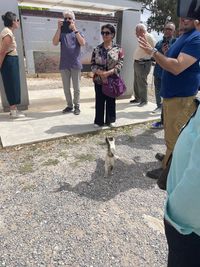
.jpeg/picture-200?_=191e64642d0)
.jpeg/picture-200?_=191e64669e0)
.jpeg/picture-200?_=191e6465e28)
.jpeg/picture-200?_=191e6463ee8)
.jpeg/picture-200?_=191e6463b00)

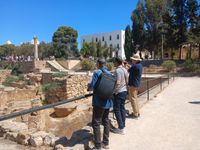
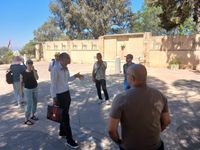
.jpeg/picture-200?_=191e6463718)

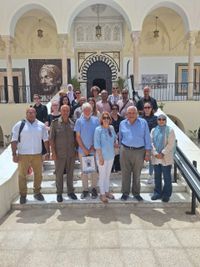
.jpeg/picture-200?_=191e6463330)
.jpeg/picture-200?_=191e64669e0)
.jpeg/picture-200?_=191e6465658)
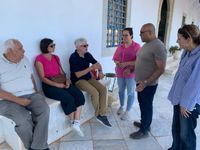
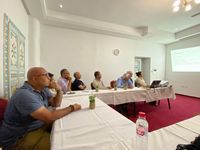
.jpeg/picture-200?_=1917f9bf548)